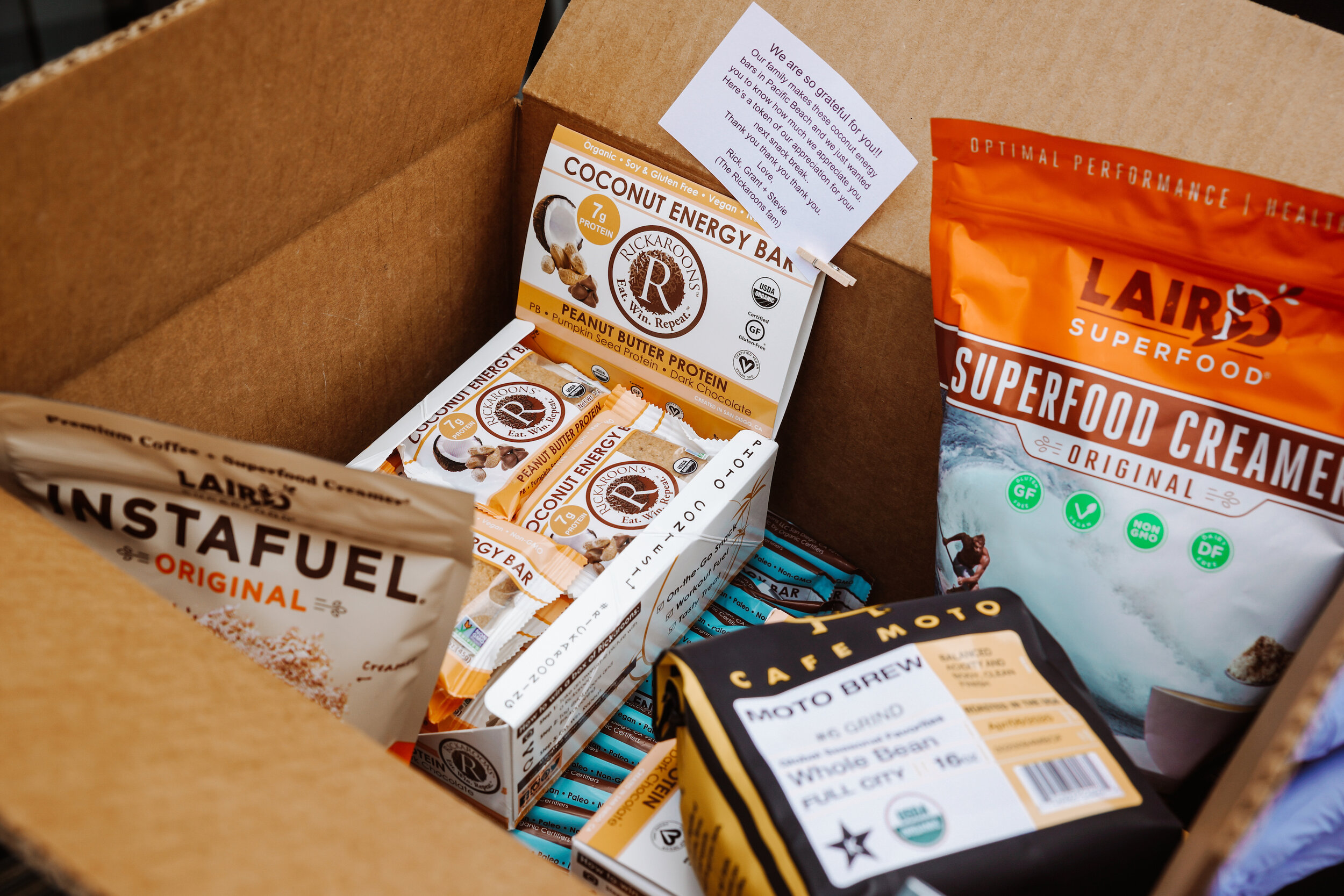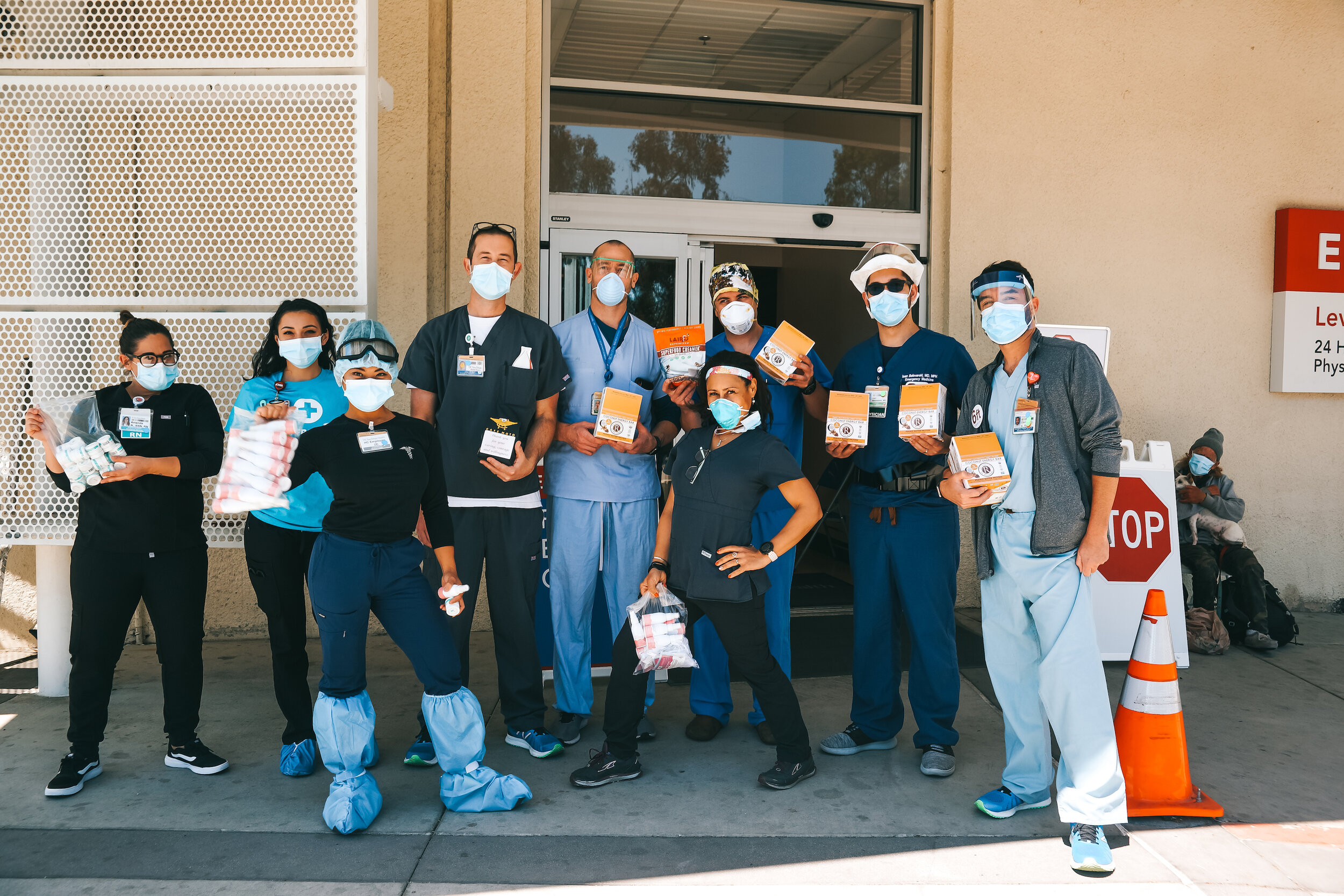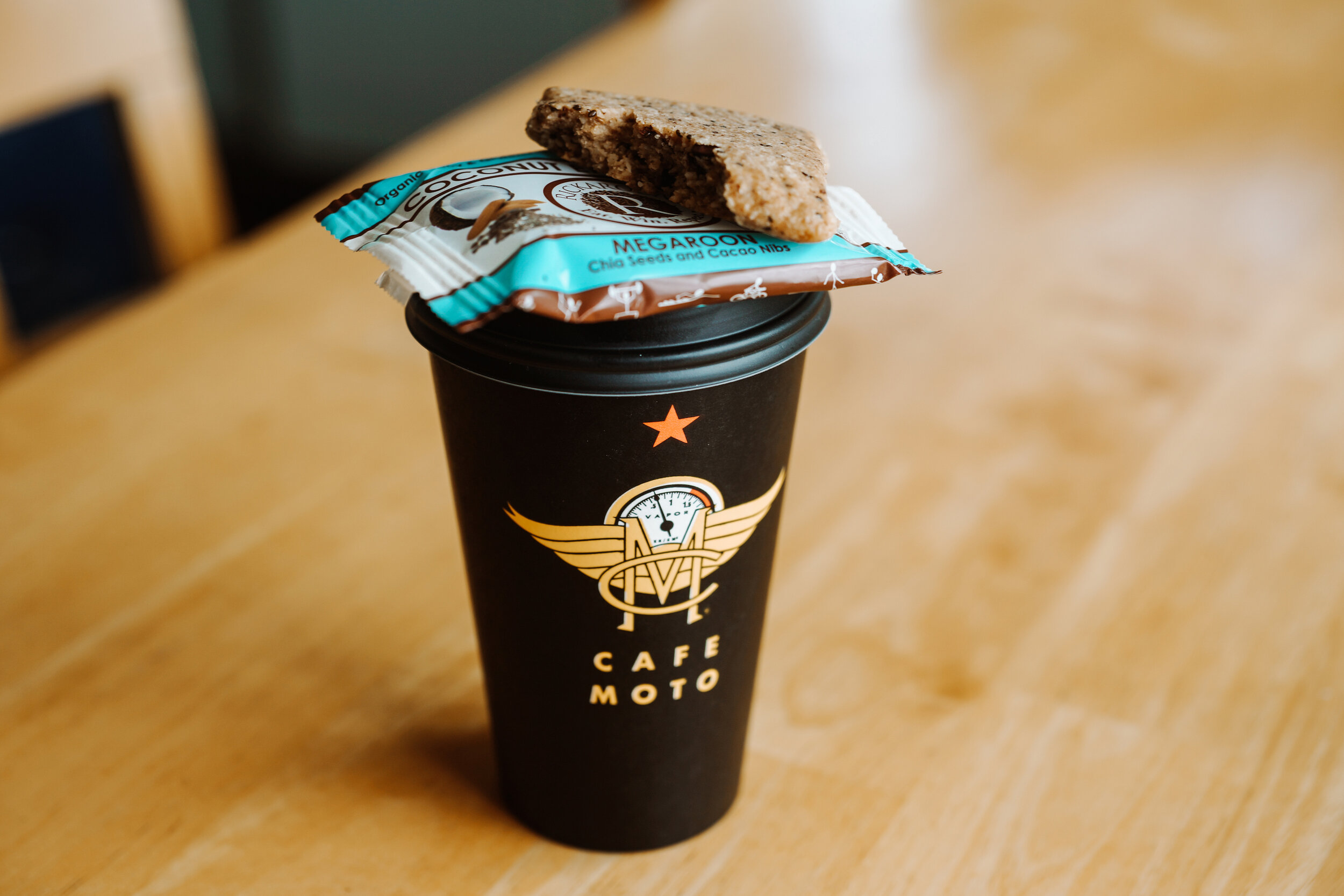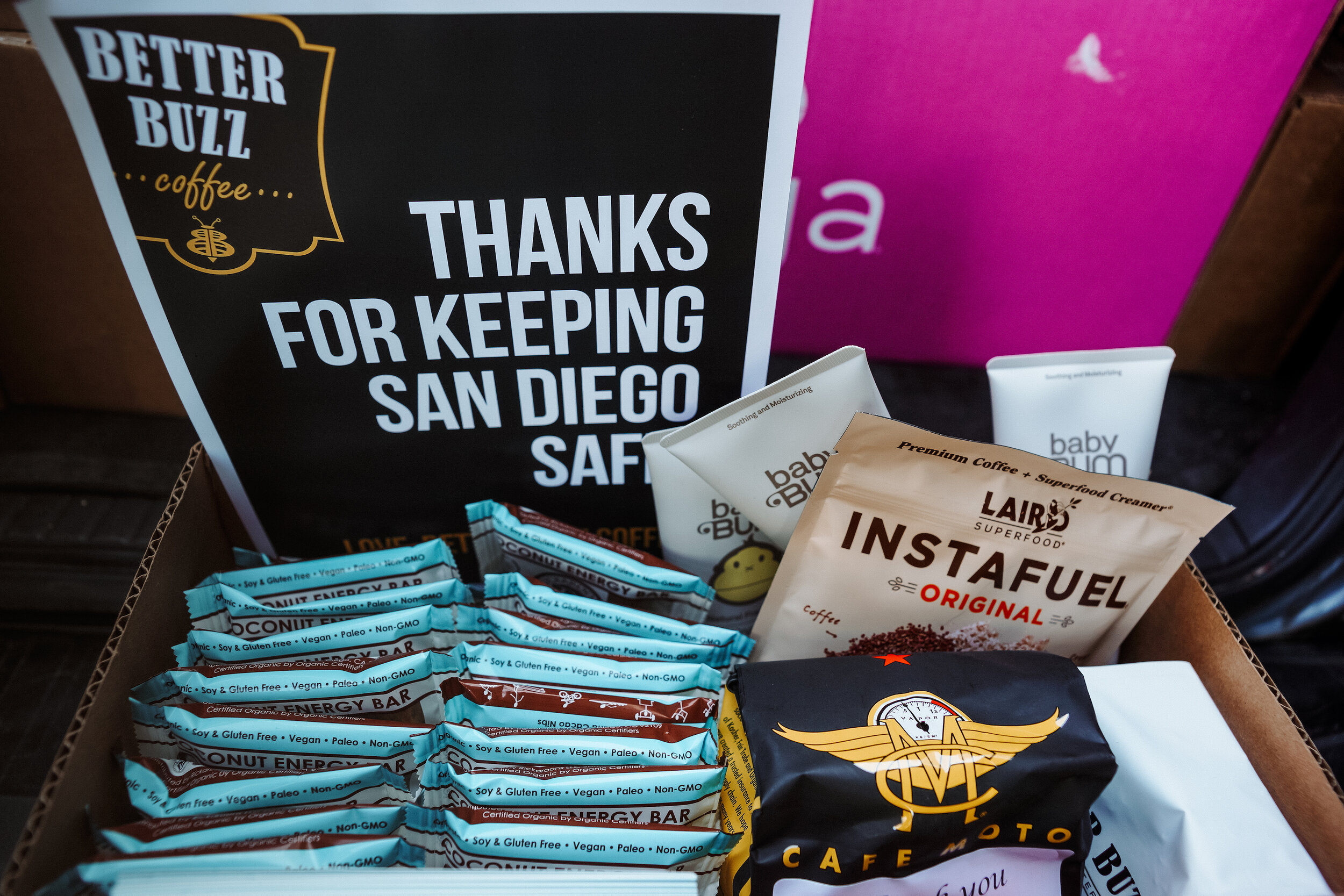The Long Way Home: This San Diego father-son team refuses to take shortcuts
“I think customers are tired of seeing ingredient lists longer than the last book they read. They’re voting with their dollars. It makes sense. There’s more and more information out there about each brand. And people are looking to support those companies that are reflect their same values.”
By Nicole Newman // Photos courtesy of Grant LeBeau, Rickaroons
Grant LeBeau (left) and his father, Rick (right).
Grant LeBeau and his father Rick launched Rickaroons in 2012, combining their expertise and values to create an energy bar company that — for all intents and purposes — embodied a lifestyle. From a young age, Rick instilled in his son the value of hard work and warned of the detrimental effects of taking shortcuts. Through example, Rick showed Grant the importance of leading an active lifestyle. And, most importantly, Grant learned from his father the importance of helping others.
Rick fell in love with a woman named Cindy, who would become the original inspiration for Rickaroons. Cindy battled multiple sclerosis, which caused the onset of multiple food allergies including of wheat and dairy. Rick set out to create a cookie that Cindy could eat. After much trial and error, research into flour varieties, experimenting with a short list of ingredients that someone with food allergies could eat — all of the bars have a base of organic shredded coconut, blended almonds and coconut palm nectar enhanced only with antioxidant-rich ingredients like dark chocolate, mint and espresso beans. In collaboration with his entrepreneurial-minded son Grant, one thing led to another and Rickaroons was born.
We spoke with Grant about how Rickaroons is making an impact in the San Diego community and got a behind-the-scenes look at how the company has evolved over the years.
Nicole Newman: Explain how Rickaroons were developed.
GL: My dad was a vegan triathlete for a while. That was before there was a Whole Foods on every corner. If you wanted something good you had to make it yourself. … In the early 2000s, he became involved with [Cindy, a] wonderful woman who had multiple sclerosis. She was advised to go gluten-free and he wanted to create for her a snack that was great on-the-go. That led to the creation of Rickaroons.
To be clear, it’s not a cure-all for MS. I don’t want to overstate that part. I think what made it good in that instance is what makes it good in general. It’s organic, gluten-free, vegan. No refined sugars. A simple ingredient list. All things that help keep your body fueled with ingredients that are easy for your body to process.
NN: At what point did the bar your dad was making become Rickaroons? What made you turn it into a business?
GL: About seven years ago or so I was ready to transition out of my old job and my dad had this great recipe that he was constantly tinkering with and giving away with friends. … The interest of our friends provided that initial platform for us to fully develop a product and get our first sales. We started at farmers’ markets and cooking out of my dad’s kitchen for a few weeks. Then we moved into a commercial kitchen and then started packaging. We went into local juice bars and coffee shops, local mom-and-pop shops, etc.
NN: How have you mastered that consistency?
GL: It’s a lot of trial and error. We have hired outside consultants. It all just comes back to trial and error, lots of error. We’ve certainly made upgrades and improvements to our packaging. We do lab testing to make sure the product is just as delicious before expiration as it was one it was when it was produced. Being an organic item with no preservatives, commercially producing an item in a category alongside Cliff Bars and Kind Bars, we have to make sure we have something that is semi-comparable to exist in the space. The priority is having as few ingredients as possible. No stabilizers. No multipliers. Those are the hurdles we’ve had to get over.
NN: How long did it take you?
GL: It’s a never-ending battle for improvement. I think in the last two months we’ve been able to increase our shelf-life from six months to eight months and we are actually in the midst of lab testing and trying to get that up to 12 months. The goal for improvement never ends.
NN: All over your website, you refer to the “Rickaroon lifestyle.” It seems like someone who is creative, active, helps the community…
GL: You kind of hit the nail on the head there. It’s a reflection of our family and the people involved with our company: the staff we hire, the athletes we sponsor with products. It’s all people who we think are representative of the brand both as a high-performer but also are just good people. We want to provide fuel to the people who are living an active, on-the-go lifestyle, doing the best they can.
NN: Can you tell me more about your beach cleanups? Why was this something that you felt passionately about doing?
GL: We all grew up by the beach. Our office is three blocks from the beach, so it’s near and dear to our hearts. We know the impact of crowds and trying to be an environmentally-sustainable company. If we can inspire groups of people to go out and make a difference in their community… We try to make a difference where we can.
NN: In what other ways does Rickaroons participate in the community?
GL: We try to have a booth every year at the national MS events. There’s a walk-a-thon and Bike MS in San Diego each year. It’s a volunteer event. Usually me or my sister or other family members volunteer. We have a booth and sell Rickaroons and the proceeds go to National Multiple Sclerosis Society. We’ve done that the last three or four years. We were supposed to go this year but coronavirus had a different plan.
We also help at an organization called STAR/PAL (Sports, Training, Academics, Recreation/Police, Athletics, League). It provides opportunity for at-risk youth to work hand-in-hand with uniformed law enforcement through after school programming and training conducted by uniformed police. It’s important in this day-in-age. They are our local, consistent partner. We try to volunteer with them, like at their surf camp they do every year. Especially because all of us at one point, were beach lifeguards at some point. We provide product to STAR/PAL as well.
NN: You send Rickaroons to hospital staff. Is that something you’ve always done or something new since COVID-19 spread? What has the response been?
GL: This is definitely new. Our business was pretty heavily effected. The majority of our business comes from wholesale to mom-and-pop juice bars and coffee shops. We were left in this place where we had a lot of product on hand and we wanted to do something to show support the staff of local hospitals. … We’ve had six or seven other companies who’ve sent us boxes for donation. We’ve put together care packages for four different San Diego hospitals. We go every Wednesday and deliver juices, coffee, creamer, hand lotions, etc.
NN: If you had to pick just one flavor, which is your go-to?
GL: Mine is the Mint To Be. It’s our mint double-chocolate flavor. When we first started, [my favorite] was the chocolate blonde, but after a couple thousand it’s changed to the mint double chocolate. It’s like a Thin Mint Girl Scout cookie. The chocolate blonde is definitely our most popular, but I’d say the mint double chocolate has a good following, too.
NN: Why do you think the makers movement is important?
GL: I think that basically, the makers movement is in response to what consumers are looking for. It’s to be in touch with their supply chain, to know where their food is coming from. I think customers are tired of seeing ingredient lists longer than the last book they read. They’re voting with their dollars. It makes sense. There’s more and more information out there about each brand. And people are looking to support those companies that are reflect their same values.
NN: What’s your goal for the future? Where do you see Rickaroons in five years? 10? 20?
GL: I’m not sure if we have a 20 year plan! But right now, we just want to survive the next six to 12 months as all of our partners are so heavily impacted by coronavirus. We do what we can to support them and continue to survive. We certainly are making a big pivot towards e-commerce because that’s the movement of the times. Moving forward, we seek to continue and to grow in the way that we have. Not taking any shortcuts. Quality ingredients. Making sure what got us to where are so far remains.





